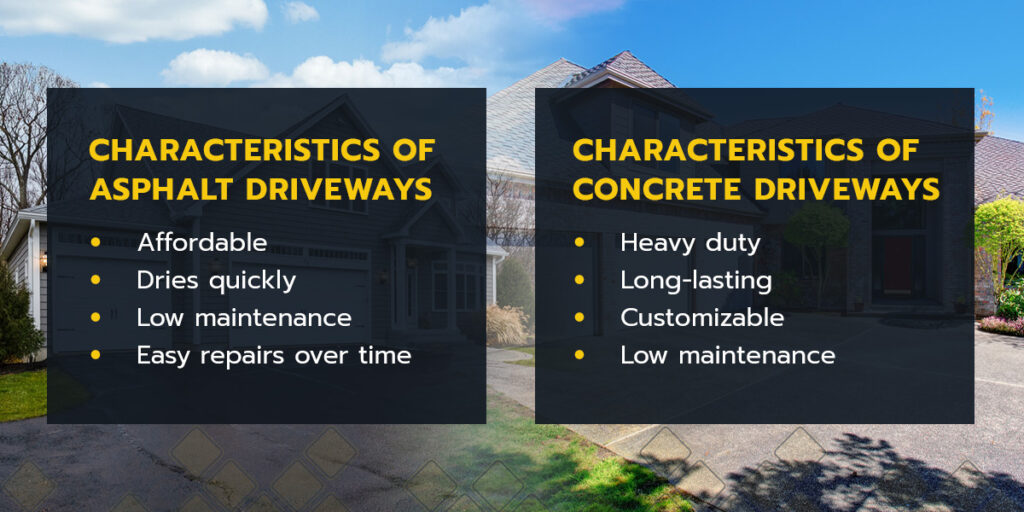Whether you have a new build or want to refresh your property, choosing the right driveway material is essential. The two most popular types of pavement include asphalt and concrete. These investments offer a way to level up the whole appearance of your home or business.
While they can boost your curb appeal, you should also consider other characteristics like affordability, durability and longevity as well. Learn about the main differences between asphalt and concrete driveways to determine which option will suit your project goals.
Characteristics of Asphalt Driveways
Asphalt driveways consist of a sand and stone mixture. Contractors use high temperatures to soften, mix and roll the materials into a smooth layer. Here are some advantages of choosing this option:
- Affordable: An asphalt driveway offers a cost-effective way to upgrade a property.
- Dries quickly: The asphalt dries quickly and can normally be used within a couple of days after the installation.
- Low maintenance: A naturally dark color easily hides oil stains or rust and requires minimal cleaning or maintenance.
- Easy repairs over time: The repairs for any cracks and potholes blend seamlessly to maintain a uniform look with the rest of the driveway.

Characteristics of Concrete Driveways
Concrete driveways include a mixture of sand, cement and gravel. Contractors pour the materials and leave them to cure for about a week. Some benefits of selecting this option include:
- Heavy duty: A concrete driveway can withstand heavier loads, which works well when you need to accommodate trucks and RVs.
- Long-lasting: The combination of proper maintenance and the correct driveway thickness can make the material last for decades.
- Customizable: A personalized driveway can look visually pleasing with your choice of colors, tints, patterns, stamps or engraving.
- Low maintenance: The inexpensive maintenance standards can make concrete a cost-effective choice in the long run.
Main Differences Between the Driveways
While asphalt and concrete driveways have similar materials and can both use a gravel base, they don’t use the same adhesive components. Asphalt uses petroleum-based products, and concrete uses cement. This variance leads to many differences, including the following:
- Overall cost: An asphalt driveway typically costs less for the upfront expenses.
- Climate and weather: Asphalt is more susceptible to softening in extreme heat and can stick to shoes or car tires.
- Aesthetic and design: A concrete driveway offers more personalization with stains, tones and tints to achieve a desired look.
- Durability and life span: An asphalt driveway isn’t as durable and may deteriorate easier or faster than concrete driveways.
- Maintenance and repairs: A concrete driveway requires less sealing over time to enhance the look and preserve the finish.
Choosing the Best Driveway for Your Home or Business
When it comes to concrete versus asphalt driveways, they’re popular for several reasons. Ultimately, the type of material you choose depends on your preferences and goals. Ask these questions to decide which option you should choose for your project.
1. What’s Your Climate Like?
If you live in a hot climate like South Florida, choosing a concrete driveway is best. The material offers enough flexibility to expand and contract, even on the hottest days throughout summer. On the other hand, asphalt driveways can maintain their appearance well in cooler temperatures.
2. What’s the Length of Your Driveway?
When the driveway dimensions are larger, more materials will be required to complete a project. Because of this, large driveways typically cost more. Asphalt offers an excellent option if you want to pay the lowest initial expenses, although concrete driveways may last longer.
3. What Appearance Do You Want to Achieve?
While today’s advancements provide some style options for asphalt driveways, concrete provides more personalization. You can go with a cohesive look with your property or explore ways to create an eye-catching, distinct design.
4. How Much Maintenance Are You Willing to Handle?
Typically, asphalt driveways require sealing within six months to a year after installation. They’ll require more sealing every few years, as needed. Concrete driveways, however, require sealing services less often.
5. Are There Any Local Ordinances You Need to Follow?
If you plan on installing or replacing a driveway, check your local or city guidelines first. They may have requirements for the type of driveway, width, thickness and other components. You can meet with a trusted professional paving contractor in your area to learn more.
Looking for High-Quality Asphalt and Concrete Paving Services? Hire The Paving Lady in South Florida
The Paving Lady is your go-to choice when you need paving and maintenance services for driveways, roads and parking lots throughout South Florida. Since 1985, we’ve been the experts you can trust when you want to improve the look of your property or preserve your investment.
Our company handles everything from small residential jobs to large commercial and public development projects. We’re committed to delivering superior professionalism, customer service and workmanship.
Want to learn more about the concrete paving services or asphalt paving services we offer? To get started, contact our team today!
